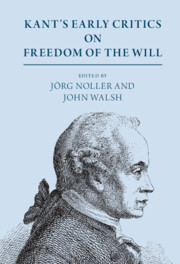Book contents
- Kant’s Early Critics on Freedom of the Will
- Kant’s Early Critics on Freedom of the Will
- Copyright page
- Contents
- Acknowledgements
- Note on the Edition and Translation
- Chronology of the Translated Texts and Kant’s Major Works
- Abbreviations
- Historical and Systematic Introduction
- I Freedom and Determinism
- II Freedom and Imputability
- Carl Christian Erhard Schmid, Lexicon for the Easier Use of the Kantian Writings, 2nd Edition, 1788
- Carl Christian Erhard Schmid, Attempt at a Moral Philosophy, Jena, 1790
- Johann Christoph Schwab, “On the Two Kinds of I, and the Concept of Freedom in Kant’s Ethics,” Philosophisches Archiv 1(1) (1792), 69–80
- Johann Christoph Schwab, “On Intelligible Fatalism in the Critical Philosophy,” Philosophisches Archiv 2(2) (1794), 26–33
- Karl Leonhard Reinhold, Contributions to the Correction of Previous Misunderstandings of Philosophers, Volume ii, Concerning the Foundation of Philosophical Knowledge, Metaphysics, Ethics, Moral Religion, and Doctrine of Taste, Jena, 1794
- III Freedom and Consciousness
- IV Freedom and Skepticism
- V Freedom and Choice
- Appendix: Biographical Sketches
- Glossary
- Notes
- Bibliography
- Index of Persons
- Index of Subjects
Johann Christoph Schwab, “On Intelligible Fatalism in the Critical Philosophy,” Philosophisches Archiv 2(2) (1794), 26–33
from II - Freedom and Imputability
Published online by Cambridge University Press: 24 March 2022
- Kant’s Early Critics on Freedom of the Will
- Kant’s Early Critics on Freedom of the Will
- Copyright page
- Contents
- Acknowledgements
- Note on the Edition and Translation
- Chronology of the Translated Texts and Kant’s Major Works
- Abbreviations
- Historical and Systematic Introduction
- I Freedom and Determinism
- II Freedom and Imputability
- Carl Christian Erhard Schmid, Lexicon for the Easier Use of the Kantian Writings, 2nd Edition, 1788
- Carl Christian Erhard Schmid, Attempt at a Moral Philosophy, Jena, 1790
- Johann Christoph Schwab, “On the Two Kinds of I, and the Concept of Freedom in Kant’s Ethics,” Philosophisches Archiv 1(1) (1792), 69–80
- Johann Christoph Schwab, “On Intelligible Fatalism in the Critical Philosophy,” Philosophisches Archiv 2(2) (1794), 26–33
- Karl Leonhard Reinhold, Contributions to the Correction of Previous Misunderstandings of Philosophers, Volume ii, Concerning the Foundation of Philosophical Knowledge, Metaphysics, Ethics, Moral Religion, and Doctrine of Taste, Jena, 1794
- III Freedom and Consciousness
- IV Freedom and Skepticism
- V Freedom and Choice
- Appendix: Biographical Sketches
- Glossary
- Notes
- Bibliography
- Index of Persons
- Index of Subjects
Summary
In “On Intelligible Fatalism in the Critical Philosophy” (1794), Johann Christoph Schwab levels several accusations against C.C.E. Schmid’s doctrine of intelligible fatalism. First, whereas the Leibnizian-Wolffian determinist can hope to overcome the forces opposed to freedom insofar as these are natural and alterable, the intelligible fatalist cannot hold any such hope because the intelligible forces opposed to freedom are immutable. Second, insofar as Schmid acknowledges a sensible matter given to the rational being, he seems committed to two kinds of obstacles to reason’s self-activity: sensible and intelligible obstacles. This supposedly makes Schmid’s view inferior to the Leibnizian-Wolffian account, which posits only one sort of obstacle to freedom. Lastly, Schwab claims that intelligible fatalism abolishes the concepts of blame and imputation. Thus, concludes Schwab, the Leibnizian-Wolffian conception of free will is superior to that of intelligible fatalism.
- Type
- Chapter
- Information
- Kant's Early Critics on Freedom of the Will , pp. 89 - 92Publisher: Cambridge University PressPrint publication year: 2022

